Which one is better, OpenCart vs Shopify?
Choosing the right platform for your business can be challenging because each has its strengths and weaknesses. Don't worry, though! This article will help you make a good decision by comparing OpenCart and Shopify.
Keep reading to get:
- What is OpenCart vs Shopify
- Detailed comparison: Price, SEO, apps, add-on, ease of use…
- OpenCart vs Shopify: Which one is more optimal?
A Quick Overview of OpenCart vs Shopify
OpenCart is an open-source platform requiring users to manage their hosting and technical setup. While Shopify is a fully hosted, subscription-based platform that provides an all-in-one solution for users to set up and manage their online stores.
OpenCart vs Shopify Detailed Comparison
#1. Pricing: Shopify Wins
Thanks to its open-source nature, OpenCart is free to download and install. However, you must still cover additional costs to run a complete store, such as hosting, a domain name, and an SSL certificate.
Let's break them down a bit:
- Hosting service: $5 – $100 per month.
- Domain name: $10 – $15 per year.
- SSL certificate: from $50 per year.
- Potential transaction fees or additional extension costs (which may start from $20/month).
In contrast, Shopify has a more structured pricing model with five distinct plans.
- Starter (for social commerce or link in bio): $5/month
- Shopify Basic (for a new business): $39/month ($29/month if paid annually)
- Shopify plan (for a growing business): $109/month ($79/month if paid annually)
- Advanced Shopify (for large-scale business): $399/month ($399/month if paid annually)
- Shopify Plus: start from $2,300/month for a 3-year contract.
Besides, some additional fees will be associated, such as domain name or transaction fees.
In my viewpoint, while OpenCart's initial cost might seem lower due to its open-source nature, hidden expenses can quickly accumulate. Shopify's structured pricing, while potentially higher upfront, offers predictability and includes essential features.
The verdict: Shopify has a more transparent and more predictable pricing system than OpenCart in the long run.
#2. Ease of Use: Shopify Wins
OpenCart requires coding skills to set up an entirely new store. Basically, you are going to follow these stages:
- Purchase a new domain and hosting
- Create a database using open-source administration (DataGrip, Dbeaver, Phpmyadmin…)
- Install OpenCart
- Complete your store setting
You can follow six steps in our OpenCart tutorial to seamlessly set up a successful online store.
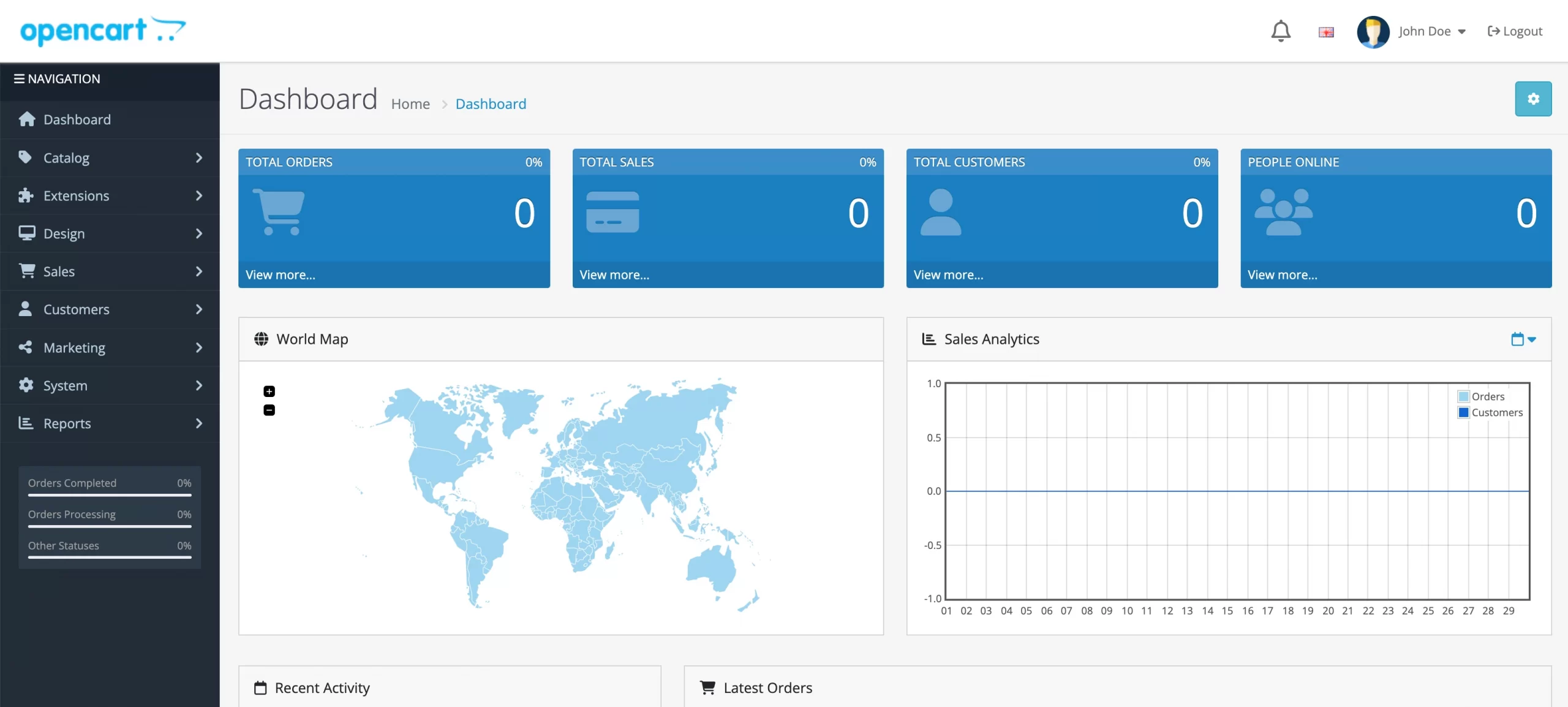
Thanks to its intuitive and convenient interface, you can easily navigate and modify any part of your site.
Here is a review from an OpenCart user:
I've tried nearly every cart/e-commerce system available and Opencart is my preferred choice. Written in PHP in a MVC(L) structure, Opencarts layout and system are very easy to understand and build on.
Dave H., OpenCart G2 Review.
The most significant gap between OpenCart vs Shopify regarding ease of use is technical skills.
With Shopify, you don’t need a line of code to create and manage your store. Start building your new Shopify store by providing your info, such as email, address, and store name and you will get into the Shopify dashboard.
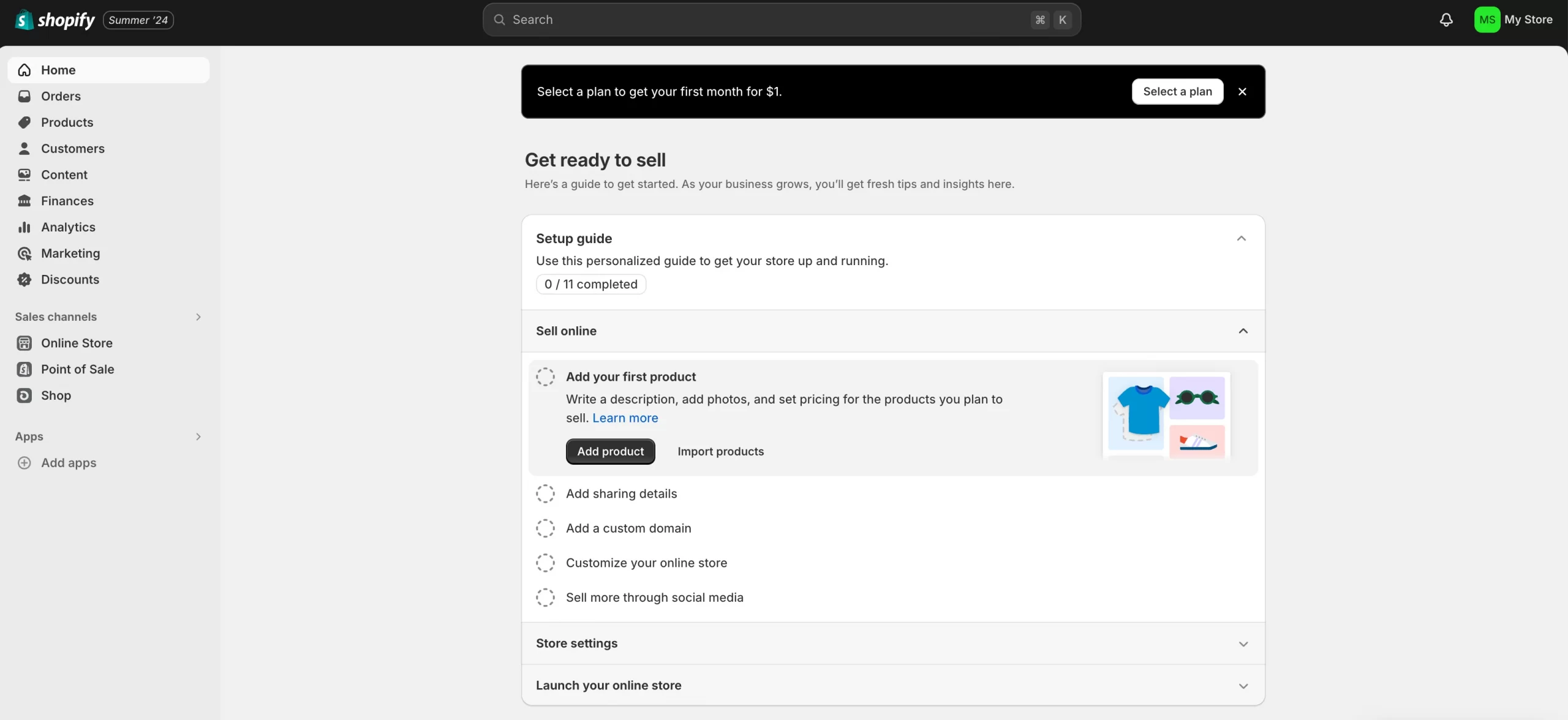
You don’t even need to fill in any of your payment information. From the dashboard – your control room – you can test, organize, manage, and modify your online store's layout, color, text, etc.
The verdict: Shopify is the winner of the ease of use round in the light of the effortless installation process and the friendly management system. OpenCart is more complicated to set up because you’ll need basic technical knowledge of hosting, FTPs, security updates, etc.
Want to Migrate Your Store and Grow on Shopify?
Having decided that OpenCart is not the perfect fit for your online business? Switch to Shopify now and rock your sales with powerful eCommerce functionalities and an extensive selection of website templates with this platform.
#3. Design & Themes: It's a Tie!
When it comes to design and themes, both OpenCart and Shopify offer a range of options.
OpenCart offers 500 free and paid templates (from $40 to $300+), all attractive and fashionable. Some of my favorite OpenCart themes are Journal, Shoppica, Sellya…
However, you should be aware that OpenCart may fall short of other competitors since the template is not supported. We find that this platform should be improved to match competitors offering wider plugin support and better page builders.
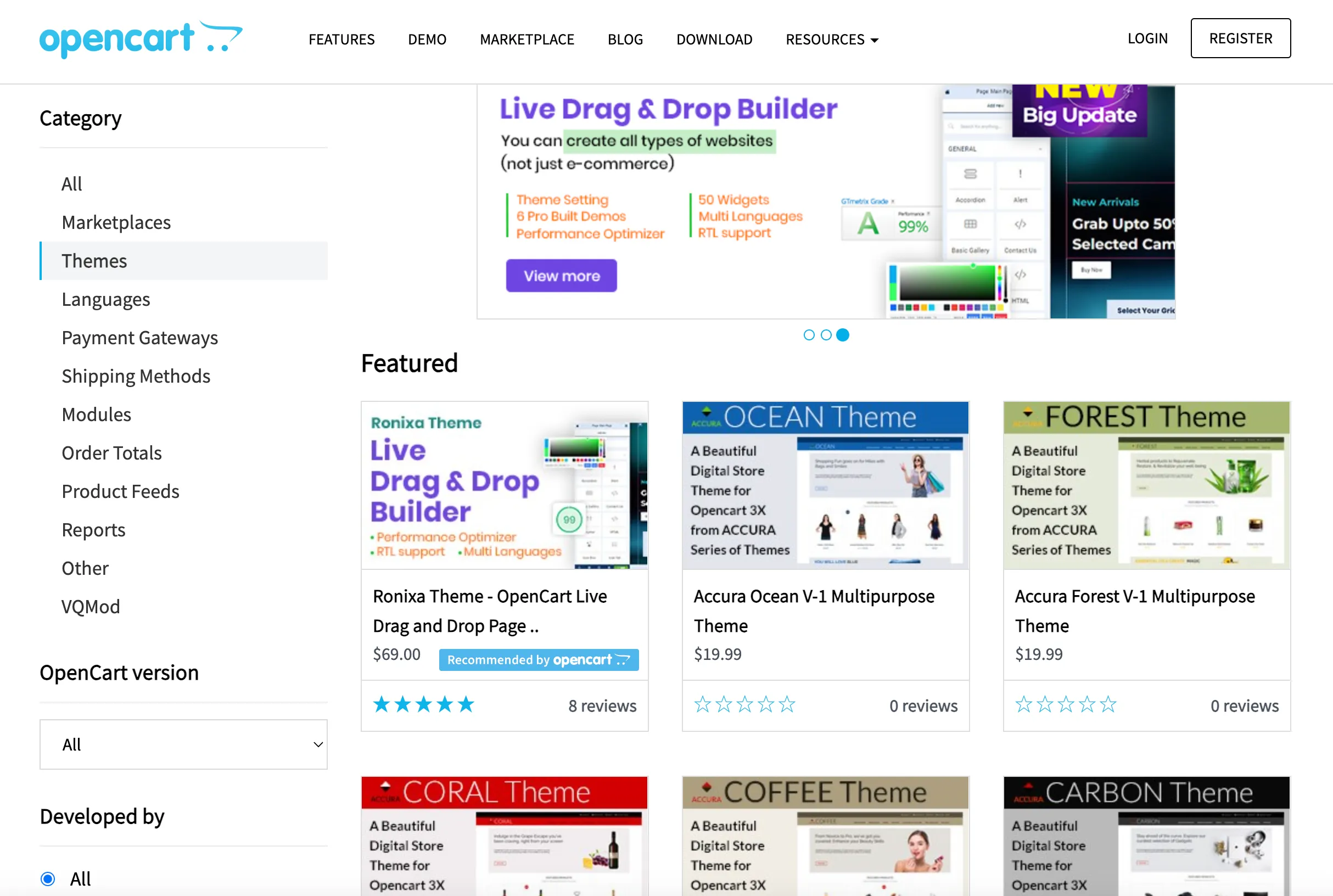
OpenCart allows you to modify any website component, and the template is not exceptional. If you are confident with your HTML, CSS, or PHP code skills, you can always edit the design to make yourself an outstanding, highly interactive look for your store.
Meanwhile, Shopify has over 200+ free and premium professional, eye-catching, and mobile-responsive eCommerce website templates you can use for your online store. You can check out my pick of 30+ best Shopify themes.

Shopify users can easily customize the template (colors, fonts, social media buttons, and so on) without using a line of code. You can navigate to the theme editor and adjust your theme directly at the front end.
You can also go the extra mile by using Liquid – Shopify's Templating Language to interact with your theme's HTML, CSS, and JavaScript. This way, you can implement even detailed changes in your design and give your store an exclusive appearance.
The verdict: Regarding theme, OpenCart vs Shopify is a tie. Both platforms are equally great when it comes to theme and customization.
#4. Store Management: Shopify Wins
Thanks to OpenCart's open-source nature, e-merchants can manage the store from orders, payment, and shipping to inventory via the admin dashboard.
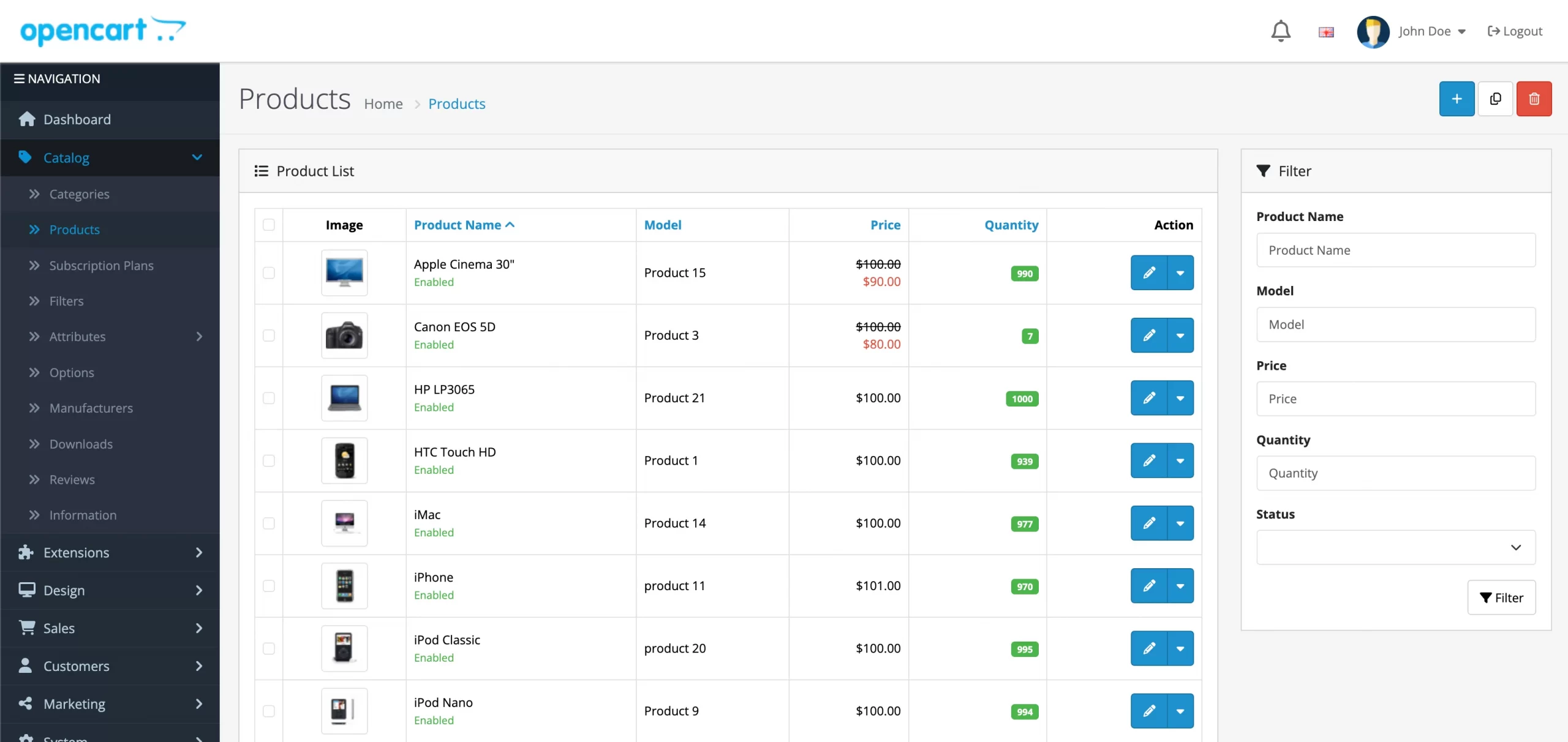
Or else, all of the cutting-edge solutions are right at your fingertips on OpenCart Marketplace. Just choose the category you need and filter the proper version, developers, and rating to get precisely what you need for your store's perfection. But my alert for you is never to forget to read other users' reviews to avoid scams, malware, or incomplete modules.
Shopify comes with a full pack of powerful functions and services.
You can easily manage orders and fulfillment, accept payment and get paid quickly, track your store's sales, and effortlessly boost it with a built-in analytics tool.
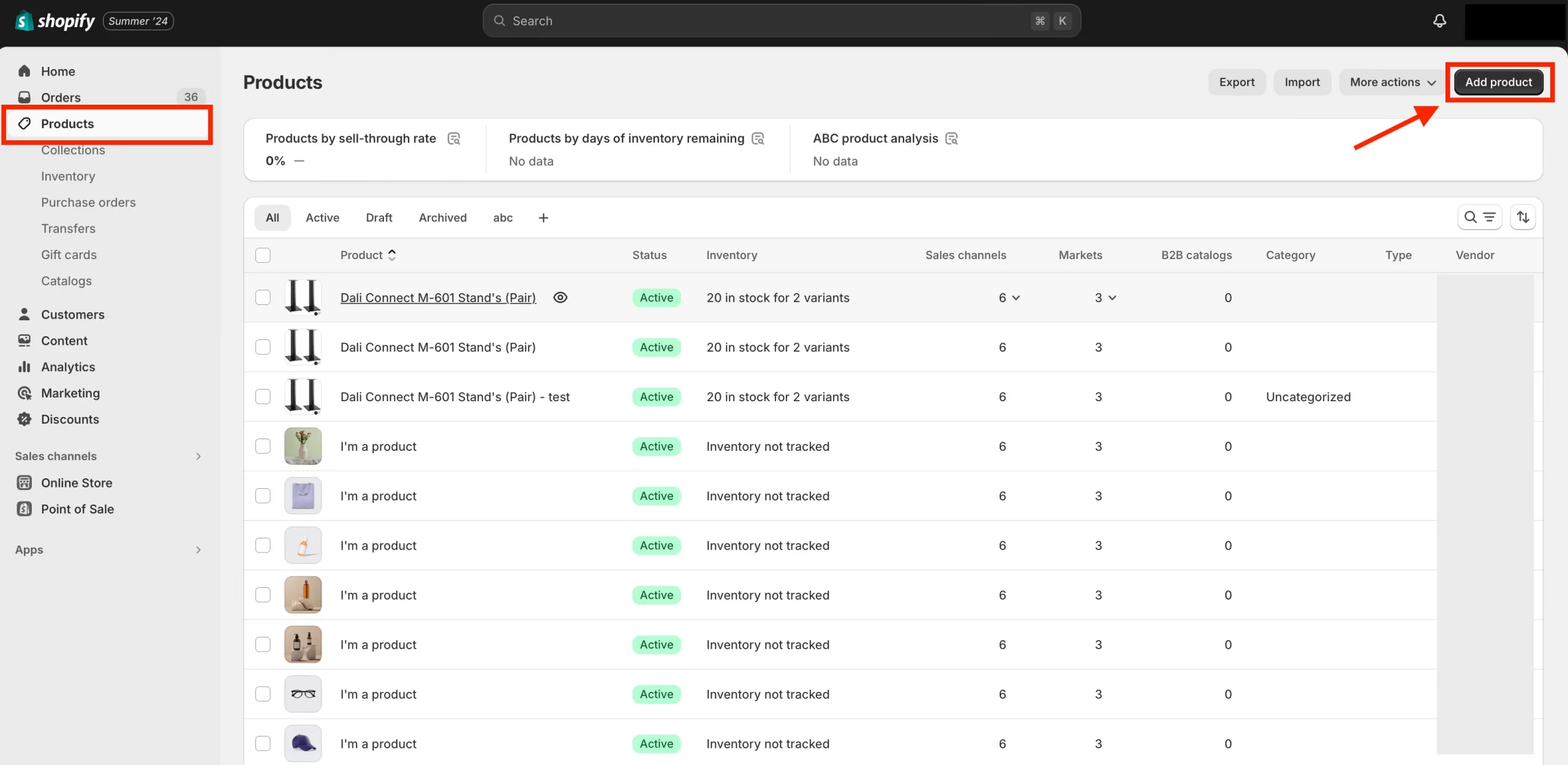
With Shopify, a full-fledged store can be nicely managed on your computer and phone. Shopify also allows you to control your cyber-based business anywhere, anytime with Shopify mobile app.
As you can see, while OpenCart's open-source nature and vast extension marketplace offer flexibility and customization options, Shopify's focus on ease of use and integrated functionality makes it a compelling choice for an efficient store management experience.
The verdict: Shopify truly outshines its rival, OpenCart, in terms of store management.
#5. Multi-Store Management: OpenCart Wins
OpenCart makes it super easy to manage an unlimited number of online stores from a single admin panel, which gives it a big advantage over Shopify's store model.
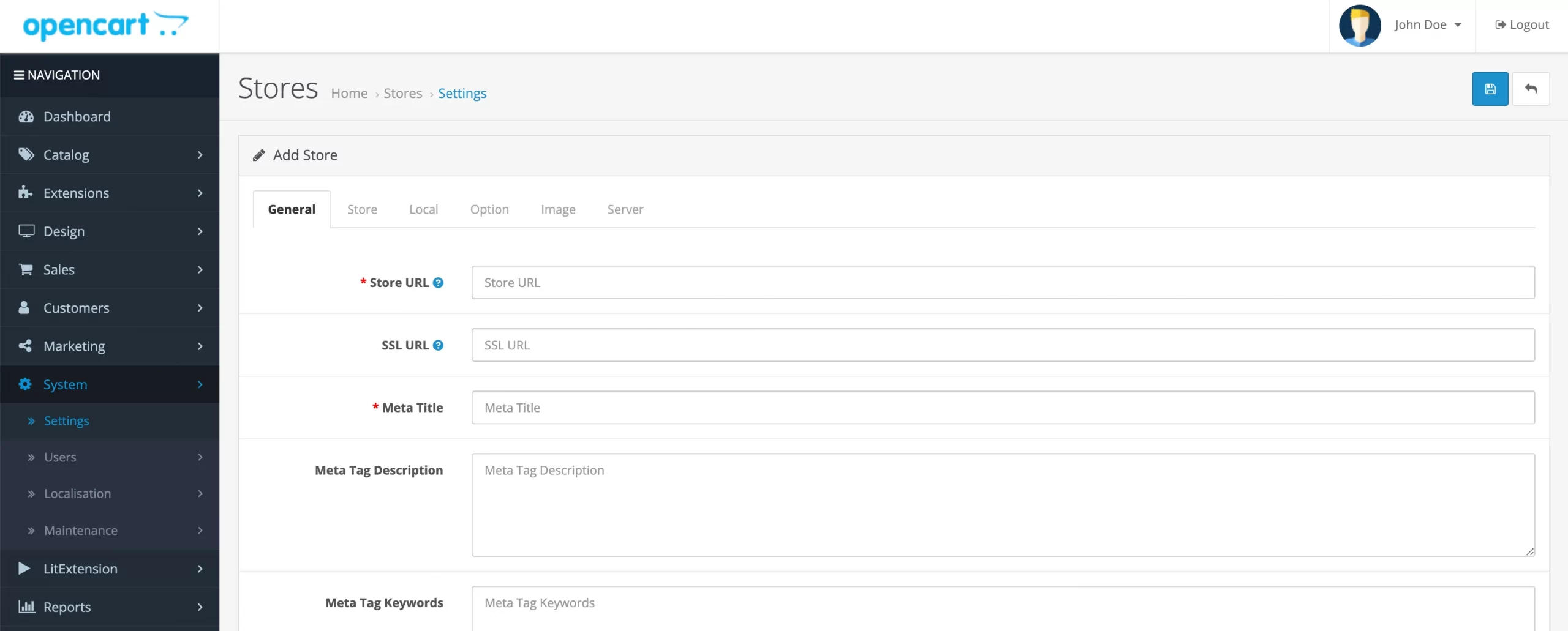
With OpenCart, you can handle multiple stores from just one installation, which saves you money and makes everything more straightforward. Each store can have its own unique look, language, and currency. This nifty feature comes with the free OpenCart software, so you don't need to worry about extra costs.
While Shopify Plus allows for up to nine expansion stores, managing multiple Shopify stores can get complicated and add to your expenses.
The verdict: OpenCart truly outshines Shopify with unlimited store management capabilities.
#6. Extensions & Apps: OpenCart Wins
Using extensions and tools can bring significant value to your store, making it more convenient and taking much work off your shoulders. If you're considering OpenCart vs Shopify, which has a better selection of apps and add-ons?
OpenCart is a really good option for apps and add-ons, with over 13,000 extensions (product feeds, reports, shipping methods, and payment gateways…) available on the OpenCart Extension Store. Also, the OpenCart developer community has made it easy to customize your store cheaply.
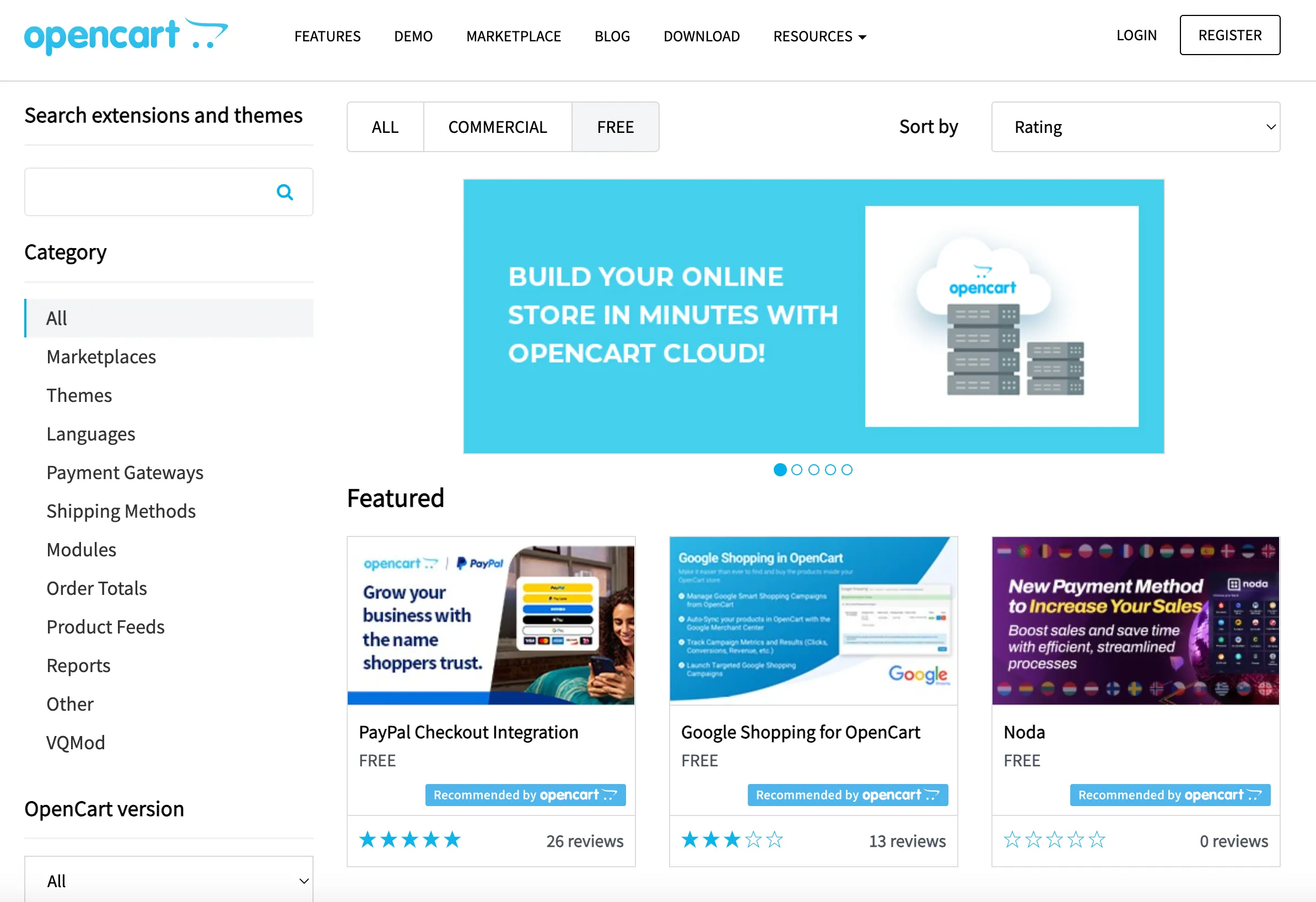
A plus for OpenCart over Shopify is that most extensions are for eCommerce. Choosing OpenCart for your e-store will benefit you greatly since all these apps directly support your work. More than that, you can use your coding skills to create custom fields that combine with the extensions.
Shopify is also famous for its vast number of apps available (over 8,000 apps). More specifically, these apps contribute a specific purpose to your store and connect it to another tool (like Xero or Zendesk). As a result, this wide range of apps is one of the considerable justifications that make Shopify a robust eCommerce platform.
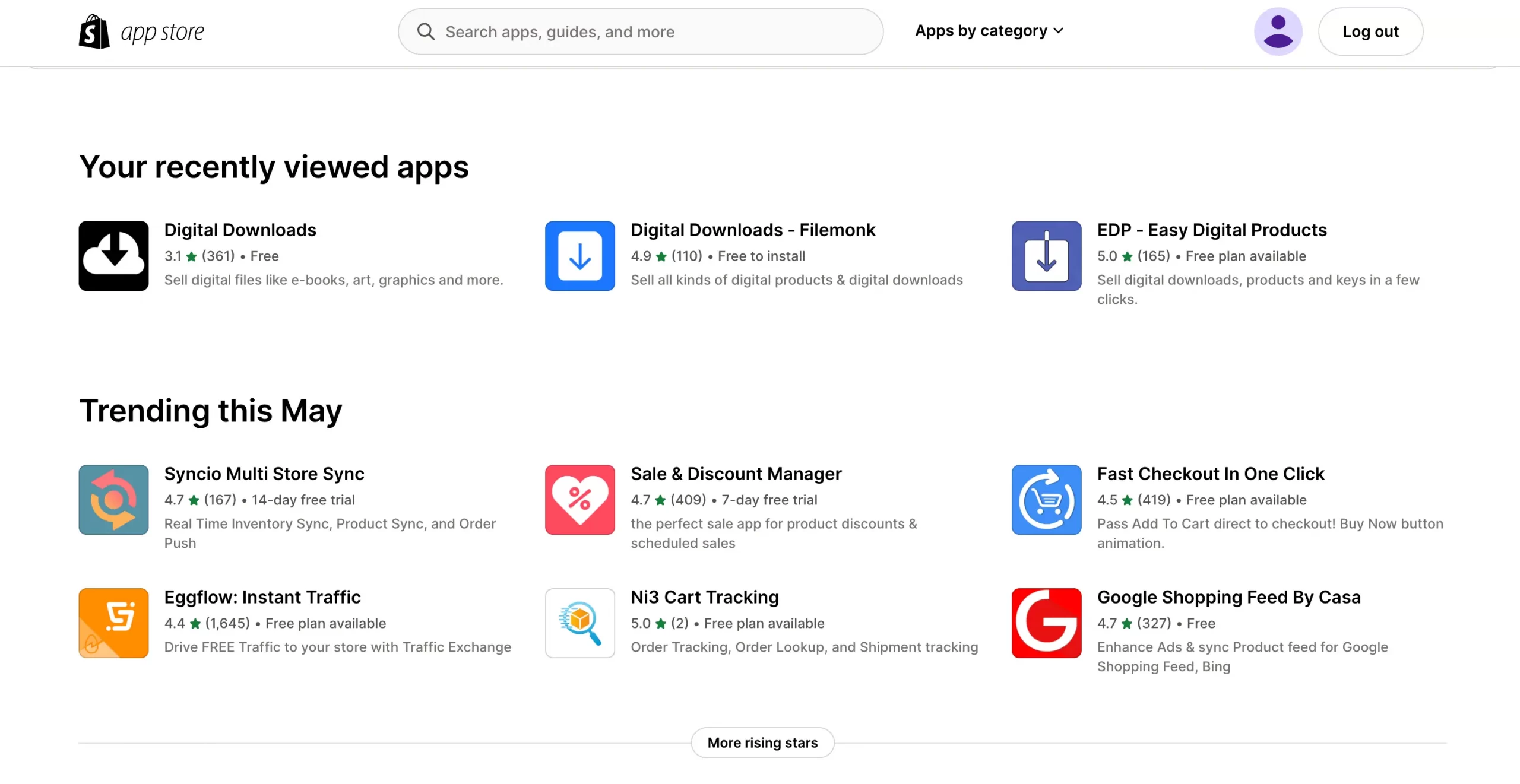
The bright side of having such a massive app store is that you have many options regarding adding functionality to your store or integrating it with other tools. However, Shopify tends to provide apps and add-ons for simple and popular functionalities such as AMP or drag-and-drop page builder instead of including them in your built-in feature. As a result, an extension may cost you more money.
But what I love about Shopify apps is that all apps have been strictly reviewed for quality and functionality, providing a smooth and reliable experience.
The verdict: OpenCart wins for more extensions (13,000) than Shopify (8,000 apps). What's more, OpenCart’s extension is cheaper than Shopify. It has more tools for your store and allows you to use custom code to increase your site ability.
Need Help to Migrate Your Store?
If you intend to switch platforms, LitExtension offers a great migration service that helps you transfer your data from the current eCommerce platform to a new one accurately and painlessly with utmost security.
#7. Payment Gateways: Shopify Wins
OpenCart supports various payment gateways, allowing merchants to choose options that best fit their business needs. As of 2024, numerous payment gateways are available for OpenCart, including famous and lesser-known options.
Some notable payment gateways for OpenCart include PayPal, Stripe, Square, Braintree… Furthermore, additional payment methods can be easily installed from the OpenCart Marketplace. Specifically, OpenCart doesn't impose any transaction fees on top of the fees charged by your chosen payment gateway!
While the wide array of options is a plus, navigating and selecting the right payment gateway from OpenCart's extensive list can be overwhelming for beginners.
On the other hand, Shopify gives you some payment options:
- Shopify Payments – the in-house gateway from Shopify that can narrow the transaction fees. To use Shopify Payments, your country must be included in the list of supported countries.
- 100+ third-party providers such as PayPal or Amazon Pay…. that may charge you additional fees per transaction.
Shopify charges transaction fees on all sales processed through third-party payment gateways. Depending on your Shopify plan, these fees range from 0.5% to 2%. However, using Shopify Payments eliminates these transaction fees.
The verdict: Shopify has advantages over OpenCart by simplifying payments with Shopify Payments, eliminating transaction fees and streamlining the setup process.
Make Your Migration Project A Breeze with LitExtension
Don’t have time to migrate from Shopify to OpenCart manually? Let LitExtension lift the burden off your shoulders with our top-of-the-class migration service. Enjoy a streamlined and secure data transfer process with no technical skill required!
#8. SEO: OpenCart Wins
Let’s continue the fight between OpenCart vs Shopify by examining the SEO capabilities.
OpenCart offers a good level of control over SEO elements. You can customize meta titles, descriptions, URLs, and other on-page factors.

As an open-source nature, OpenCart will allow for the customization of robots.txt, sitemaps, FAQ schema, and other technical aspects crucial for SEO performance. However, that comes at a cost and requires a bit of a learning curve. You will need some technical knowledge to utilize its SEO capabilities fully.
On the bright side, a wide range of SEO extensions are available in the OpenCart Marketplace, offering features like SEO audits, keyword tracking, and advanced optimization tools. Also, you can use our OpenCart SEO tips to optimize your SEO performance better.
So, what about Shopify SEO?
Shopify provides several built-in SEO features, such as automatic sitemap generation, customizable meta tags, and URL editing. With Shopify, it's easier to use for beginners, with a more intuitive interface for managing basic SEO settings.
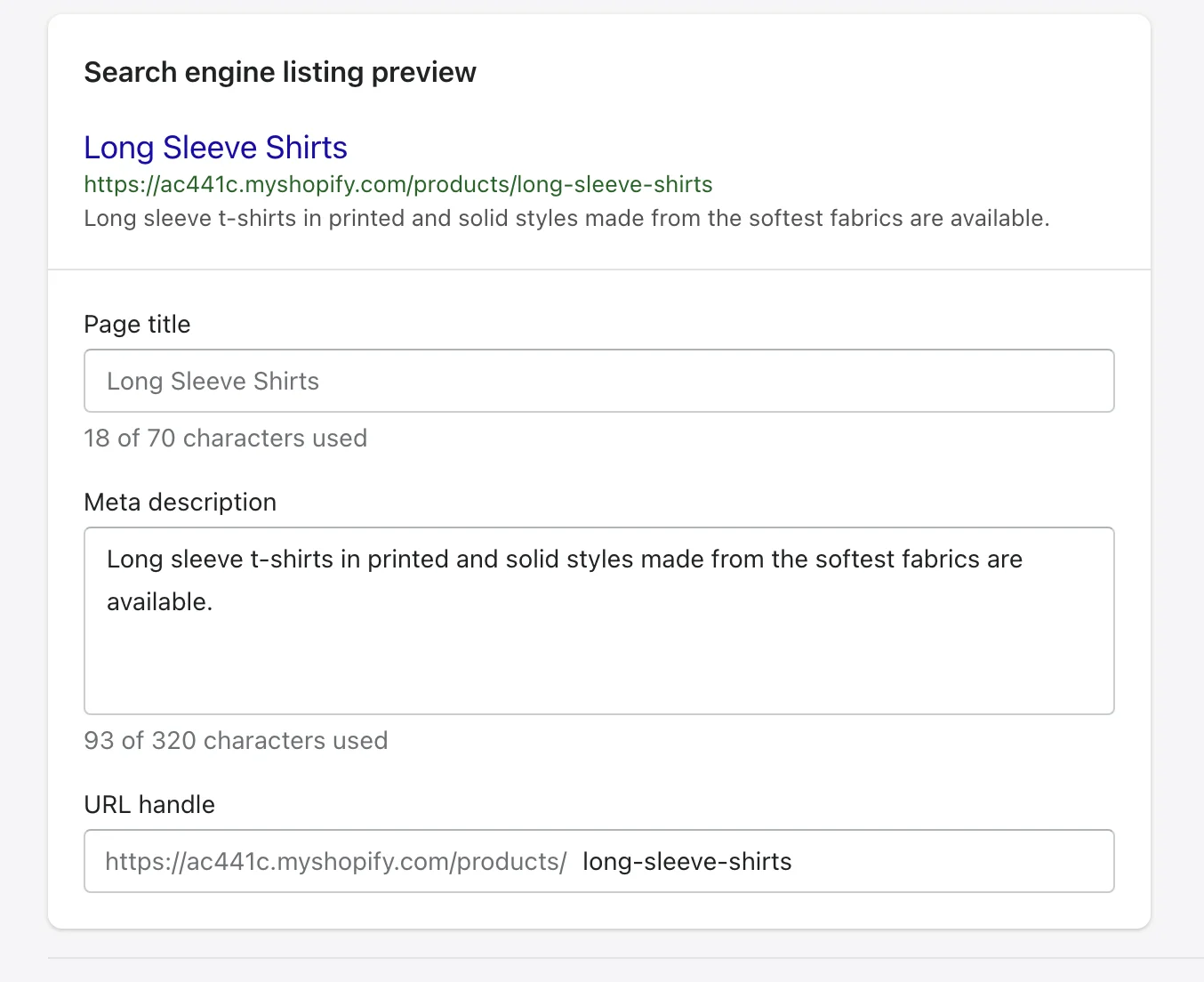
Along with basic SEO features such as meta titles, meta descriptions, responsive capability, and so on, a big benefit Shopify gives you is the ability to self-arrange your site’s category. Thus, this allows you to make a logical, easy-to-navigate site structure that will help you gain more SEO points and increase customer experience.
While generally good, some users find limitations in customizing certain technical aspects compared to OpenCart's flexibility.
The verdict: We mark OpenCart as the winner of the SEO battle when it offers more control and flexibility in technical aspects.
#9. Security: Shopify Wins
There are always chances that your store might face complex dilemmas of security risks. In one way or another, your website will need safeguarding to avoid getting attacked and leaking information.
Using an open-source platform such as OpenCart requires setting up and securing your own store. OpenCart is not responsible for protecting your website. Therefore, there are several tasks you need to take to ensure the security of your shops, such as directory and folder protection and file permission.
For instance, enabling SSL for your OpenCart website and admin panel is necessary too. Therefore, it can prevent your data from being stolen when transferred back and forth by any middleman. You can activate the SSL or HTTPS by navigating to Settings → Server → Hit “Yes” at the option “Use SSL”.
On the other hand, Shopify offers users many security solutions for their stores, customers, and their finances. This is one of the main benefits of Shopify vs self-hosted solutions.
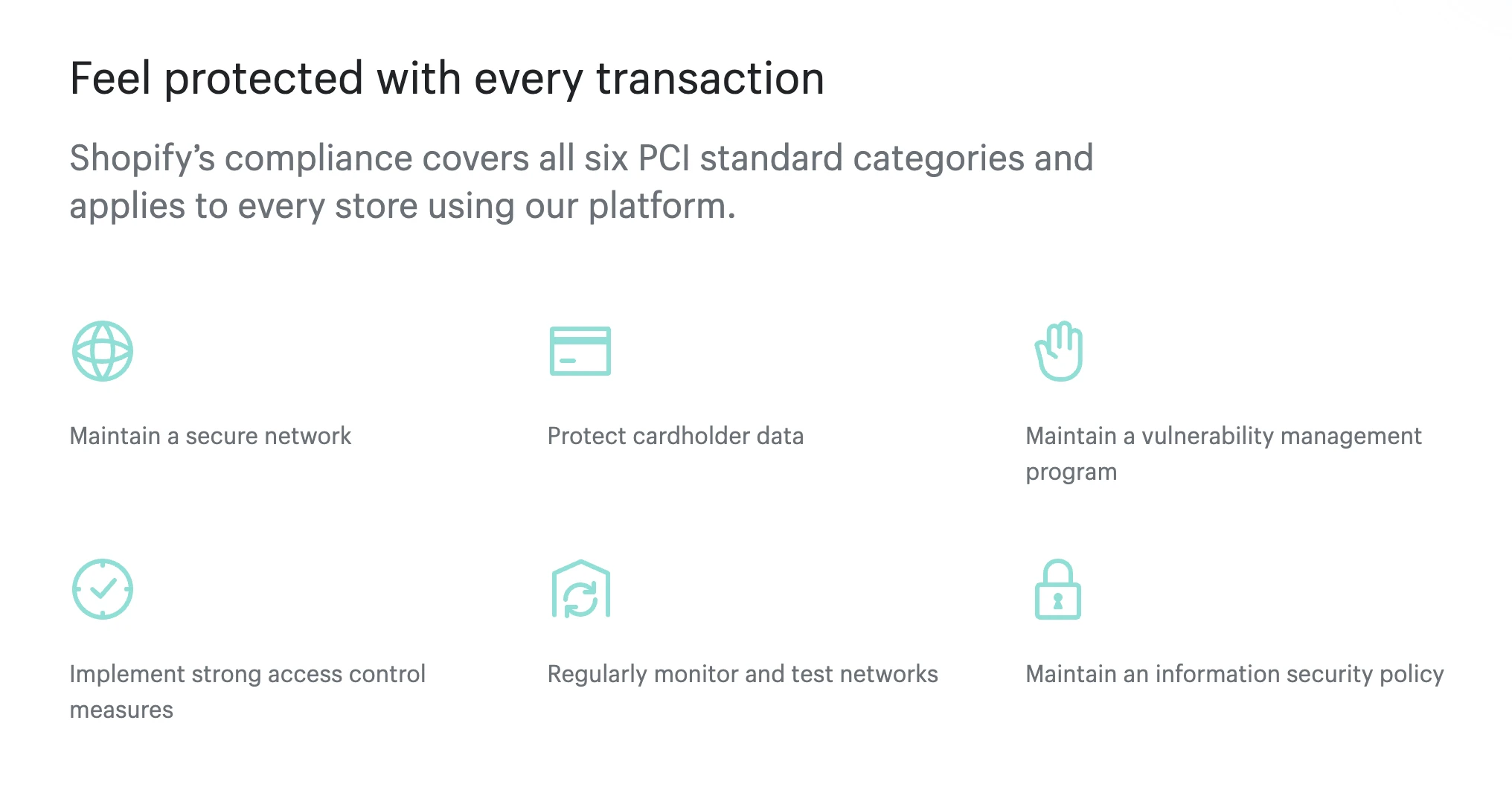
Shopify is PCI level 1 compliant for credit card processing, which means it follows the highest standards of server compliance and provides PCI compliance to protect payment processing.
Secondly, this leading SAAS platform also helps you to keep your customer data from harm by the GDPR (General Data Protection Regulation). This process will limit the login attempts and make sure app developers can only reach the data they need to.
Lastly, a fraud protection system will flag potentially fraudulent orders so that you can review them before processing them. An order has been flagged, so there might be a risk waiting for you. Thus, you can manually check this while fulfilling the order.
The verdict: Shopify as a hosted cart makes protecting your website much more convenient than OpenCart. With OpenCart, you will need to put much effort into creating a security system.
#10. Support: Shopify Wins
Any merchants prefer a hosted cart over an open cart for customer support. Apparently, customer service is nonexistent with most open-source solutions.
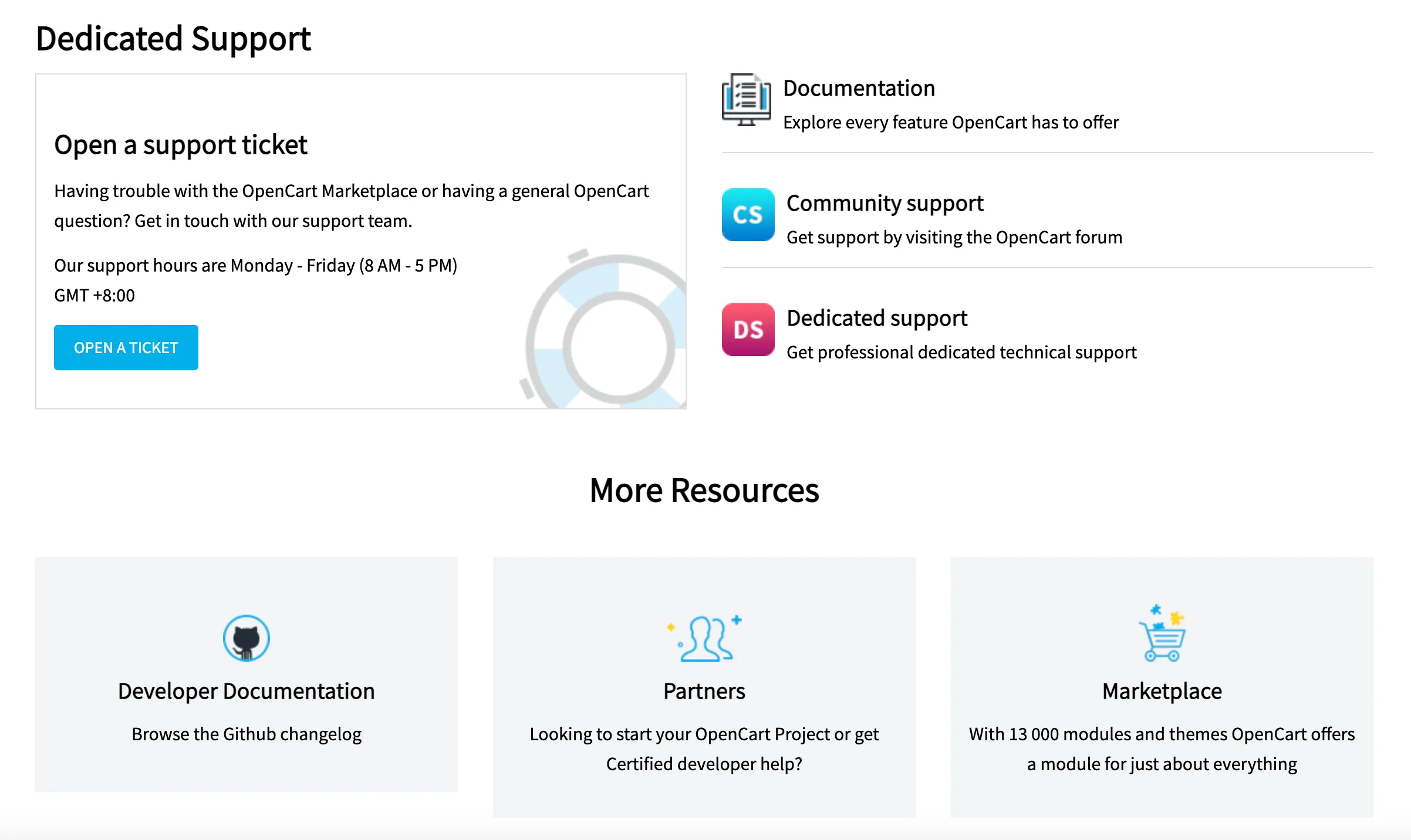
OpenCart has 4 types of support:
- Support ticket: you submit a ticket for general questions (support time: Monday – Friday on a workday)
- Help docs: all the docs for your store management
- Community support: a community forum that allows everybody to share their knowledge and experience in running an online business
- Enterprise support: which may cost from $10 to $300
As a hosted eCommerce platform, Shopify gives its customers complete support. In addition, you can even hire an exceptional support team for your store. Currently, Shopify offers these support channels:
- 24/7 phone support and live chat support
- Social media support
- Community forum
- Email support
- Help Center
- Video tutorials
- Advanced specialist support
The verdict: Apparently, Shopify provides better support for your store. For OpenCart, you need to find your own support on the OpenCart forum or use a paid service to get the assistance you need.
OpenCart vs Shopify: Which One Is Best for Your Business?
So we’ve just analyzed the difference between the two dominant eCommerce platforms, OpenCart and Shopify, in terms of essential features. Each platform has pros and cons, so between OpenCart vs Shopify, which one is best for you? It greatly depends on the needs of your business.
Choose OpenCart if:
- You are tech-savvy and comfortable with coding and server management.
- You require extensive customization and control over your store's design and functionality.
- You plan to operate multiple online stores.
- You are on a tight budget and prioritize a free, open-source solution.
Choose Shopify if:
- You prioritize ease of use and a user-friendly interface.
- You prefer a hosted solution with built-in security and maintenance.
- You need reliable and responsive customer support.
- You value scalability and plan to grow your business significantly.
OpenCart vs Shopify: FAQs
Each platform has its own advantages and disadvantages. OpenCart's open-source nature controls your website, allowing you to add custom fields and customize features. Conversely, Shopify includes all necessary features, allowing your website to generate profits with the Basic Plan.
OpenCart is still relevant in 2024 and beyond, especially for businesses needing extensive customization, multi-store management, and granular control over their online stores.
Yes, OpenCart is a good platform, especially for those who value its customization, cost-effectiveness, and multi-store management strengths.
It's definitely customer support. Shopify offers multiple support options such as live chat, email, and tickets, while OpenCart is more challenging to access and may require extensive self-learning through its forum.
Shopify competes against a diverse range of companies in the eCommerce platform market, each offering unique features. Here's a breakdown of some of Shopify's main competitors: BigCommerce, Wix, Squarespace and Magento.
Final Words
Finally, if you are unhappy with your current site builder, Shopify or OpenCart, and decide to move to another platform best suited to your store, it's time for a migration.
Assuming that you intend to re-platform your current website from OpenCart to Shopify or Shopify to OpenCart, feel free to contact LitExtension – #1 Shopping Cart Migration Expert that helps you to transfer all your data, including products, customers, orders, and other data from one platform to another in just a few clicks.
Don't forget to check out our blog and join our Facebook Community to get more tips and news.
Good luck!

